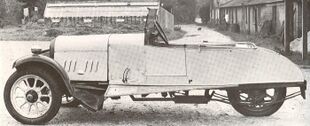Company:Castle Three
| Castle Three | |
|---|---|
 | |
| Overview | |
| Manufacturer | Castle Motor Company |
| Production | 1919-1922 |
| Body and chassis | |
| Class | cyclecar |
| Powertrain | |
| Engine | 1094 cc Dorman or 1207 cc Peters in-line 4-cylinder |
| Transmission | two- or three-speed |
| Chronology | |
| Successor | In development[1] |
The Castle Three was a British three-wheeled cyclecar made from 1919 to 1922 by the Castle Motor Company of Castle Mill Works, New Road, Kidderminster, Worcestershire.
History
The company was originally a car repair business founded in 1906 by brothers Stanley and Laughton Goodwin but grew to make munitions during World War I and entered the car building business with the coming of peace and the post-war boom.
The cars
The car was aimed at the top end of the Cyclecar market and so was fitted with a four-cylinder, water-cooled engine. The first batch of cars had side-valve, straight four, Dorman engines of 1094 cc with the remainder using Belgian Peters 1207 cc engines. These were in-unit with a gearbox, either of two-speed epicyclic or three-speed conventional type and drove the single rear wheel by a shaft and bevel gears.[2]
The open two-seater body with dickey seat had a smart nickel-plated radiator and electric lighting and was attached on a chassis with the suspension using quarter elliptic leaf springs at the front and semi elliptic at the rear. Unusually for a cyclecar, artillery wheels were used rather than wire-spoked ones.
The car was exhibited at the 1919 London Motor Show and a reputed 2,300 orders were taken. Not all these were confirmed and it is estimated that around 350 were made. Two are known to survive. [3]
A prototype of a four-wheel version was made but never went into production. The company closed in 1922, selling the works to a carpet maker.
Successor
| Castle Three Motor | |
|---|---|
| Overview | |
| Manufacturer | Castle Three Motor Company |
| Body and chassis | |
| Class | Three-wheeler |
| Body style | roadster |
| Layout | FR |
| Chronology | |
| Predecessor | Castle Three |
In August 2013 the Castle Three Motor Company Limited was incorporated in Alnwick, Northumberland with plans to develop, manufacture and sell new generation three-wheeled sports cars for the recreational and motor sport markets.[4]
While the original had 2+1 seating and a four-cylinder engine, the new three-wheeler will have two seats and use an externally sourced twin-pot — either in V or boxer form — to power the rear wheel via a largely proprietary drivetrain.[1]
See also
- List of car manufacturers of the United Kingdom
References
- ↑ 1.0 1.1 Autocar Article (Dated 15 August) http://www.autocar.co.uk
- ↑ Baldwin, N. (1994). A-Z of Cars of the 1920s. Devon, UK: Bay View Books. ISBN 1-870979-53-2.
- ↑ G.N. Georgano, N. (2000). Beaulieu Encyclopedia of the Automobile. London: HMSO. ISBN 1-57958-293-1.
- ↑ Company website [1]
 |
